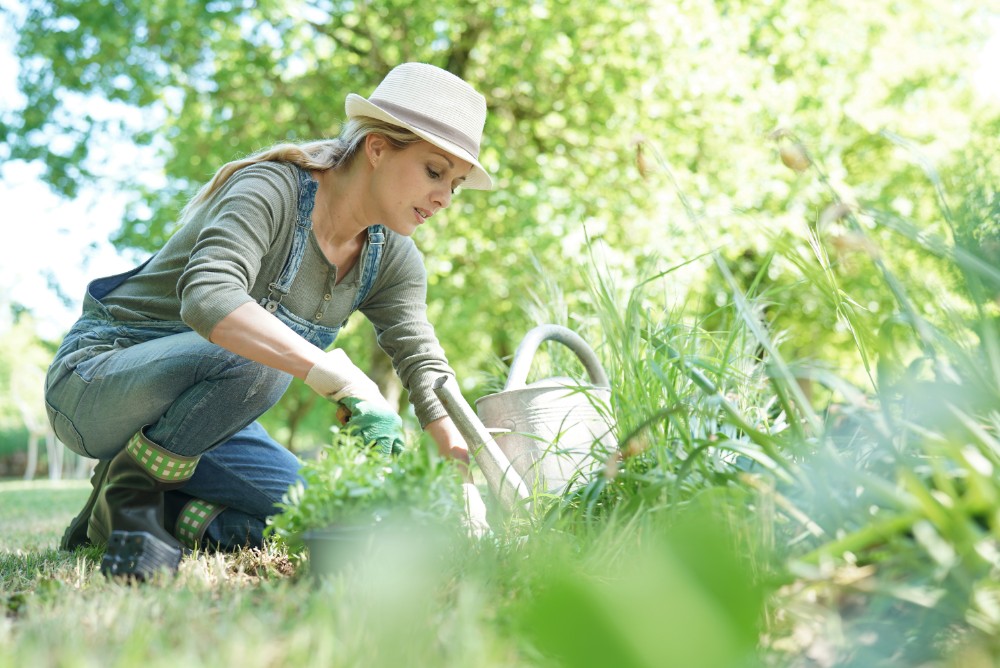Part of a strong recovery is finding engaging new activities to give yourself a sense of direction and keep from getting bored. Learning new skills is good for your self-confidence and helps connect you to other people with similar interests. Gardening can be an especially good activity for people recovering from addiction. Here’s why.
It gets you outside.
Most of us spend far too much time inside. There are two primary reasons why this isn’t good for you. First, indoor air quality is often pretty bad. There may be carbon monoxide, carbon dioxide, pollen, pet hair, mold, bacteria, dust, and other pollutants. In fact, indoor air pollution is often more concentrated than outdoor air pollution, which can lead to fatigue, allergies, and greater risk of respiratory infection.
Second, most of us don’t get enough sunlight. Your body needs sunlight to produce vitamin D and most of us are moderately vitamin D deficient from spending so much time inside. Vitamin D deficiency has been linked to various conditions including weak bones, cardiovascular disease, diabetes, obesity, cancer, and autoimmune diseases. People with a history of substance use may already be at greater risk for most of these conditions. And autoimmune diseases and obesity promote inflammation, which several recent studies have linked to depression.
It’s a form of service.
Service is really caring for anything other than yourself, even plants. Being responsible for other living things helps you look past your own problems. Beyond that, having plants to take care of gives some structure to your life. You have to make sure they’re watered and getting enough sunlight. Plants aren’t typically as demanding as pets or children, but if you want them to flourish you have to give them regular attention.
It’s good moderate exercise.
Regular exercise is one of the best things you can do for your recovery. Many studies have linked moderate exercise to numerous health benefits including better cardiovascular health, lower stress, better sleep, lower risk of depression and anxiety, and better mobility, even into old age. Studies have even found that exercise changes the structure of your brain, thickening the prefrontal cortex, which is responsible for planning, self-control, emotional regulation, and attention, as well as adding new neurons to the hippocampus, a part of the brain involved with consolidating new memories.
Gardening can be a good form of moderate exercise and how strenuous it is depends on how involved you want to get. It could be as light as walking around for a few minutes with a watering can or it could be as intense as digging up the earth, carrying soil, mulch, and fertilizer, landscaping, and weeding. Unlike many forms of exercise such as biking, running, or lifting weights, gardening requires a large variety of natural movements like carrying, squatting, twisting, lifting, and walking.
Getting your hands dirty is healthy.
There are common soil bacteria called Mycobacterium vaccae, which has several interesting benefits. There is research underway to study whether dead Mycobacterium vaccae might be an effective form of immunotherapy to treat various conditions including allergic asthma, cancer, depression, leprosy, psoriasis, eczema, and tuberculosis. Researchers at the University of Bristol have found that Mycobacterium vaccae stimulates a newly discovered kind of neuron. Experiments on mice have found that the bacterium increases serotonin production and reduces anxiety. Another study, this one conducted by Susan Jenks at the Sage Colleges, found that mice fed live Mycobacterium vaccae were able to navigate a maze twice as fast as other mice and evinced less anxiety. Obviously, you don’t want to go around eating dirt, but there’s evidence to suggest that exposure to these common bacteria can improve your health in several ways. Less anxiety means less stress and fewer cravings.
It promotes healthy eating.
Healthy eating is one of the most important lifestyle changes you can make while recovering from addiction. Many studies have found that a healthy diet can improve mood and reduce your risk of depression. Many people recovering from substance use disorders also have health issues to consider. Excessive drinking, for example, can damage your cardiovascular health, increase your cancer risk, and lead to malnutrition. A healthy diet can help your body heal and give you more energy. That typically means cutting out processed foods, especially foods containing sugar and inflammatory omega-6 fats. Most studies have found that the healthiest diets are mostly whole foods and include a variety of fruits and vegetables, which are high in nutrients and fiber.
One way to get more vitamins and fiber in your diet is to grow some of your own food. Even a small garden can provide a variety of fresh fruits and vegetables, including lettuce, greens, tomatoes, peppers, blueberries, and fresh herbs. Not only does growing your own vegetables take a little money off your grocery bill, but the food often tastes better and is more nutritious because it came from right outside your house and wasn’t transported from thousands of miles away.
It’s easily scalable.
When you’re starting a new hobby, you don’t necessarily want something you have to jump into with both feet. Anything that has large initial investments is likely to put you off because you’ll have wasted your time and money if it turns out you don’t like it. However, gardening is easily scalable. At one end of the scale, you can buy a potted basil plant to set on your windowsill and use for cooking. At the other end of the scale, you start a small farm in your back yard or build a greenhouse. You can start small and build slowly, putting in as much or as little effort as you want.
It can be social.
Gardening can also be a very social activity. You can get together with friends to care for plants, then share the harvest. Community gardens are also popular in many areas and give you a chance to get to know your neighbors in a positive environment. Many communities also have produce markets or exchange programs. By getting involved with these, you can make a little extra money, get fresh produce that you can’t grow yourself, and make friends who are also into gardening. This can lead to a greater sense of connection to the community.
Offering a full range of recovery and mental health services, Detox Center of Colorado offers “Expanded Recovery” to enrich our clients’ lives in mind, body, and spirit. Through evidence-based therapy options and the endless adventure of Colorado, Detox Center of Colorado fosters connection, encouraging clients to get connected to themselves, their peers, their families, and their higher power. With the power of recovery, clients are restored to full health and experience life-changing healing. Call us today for more information: 303-536-5463




